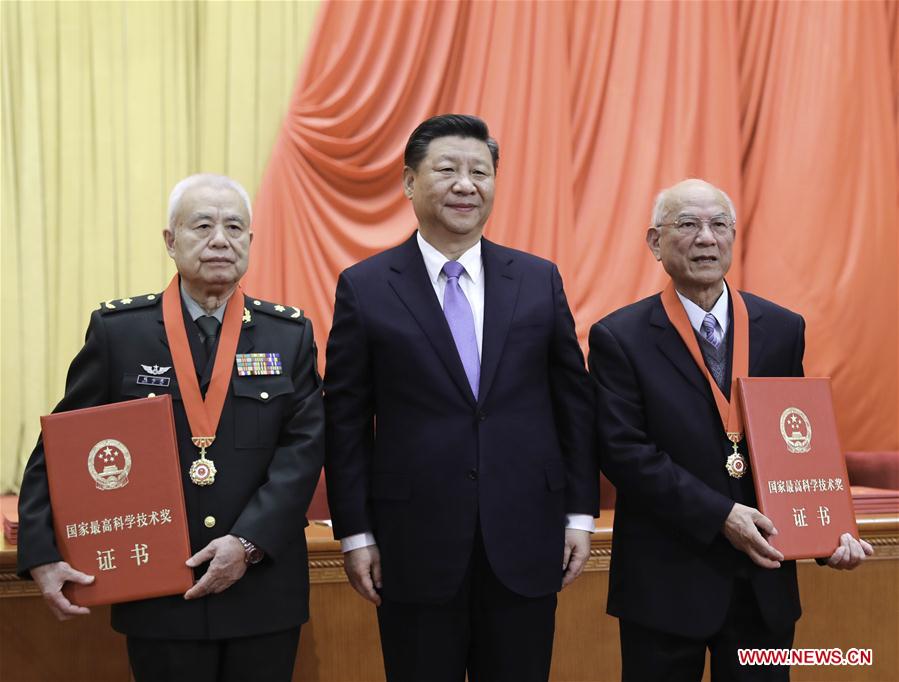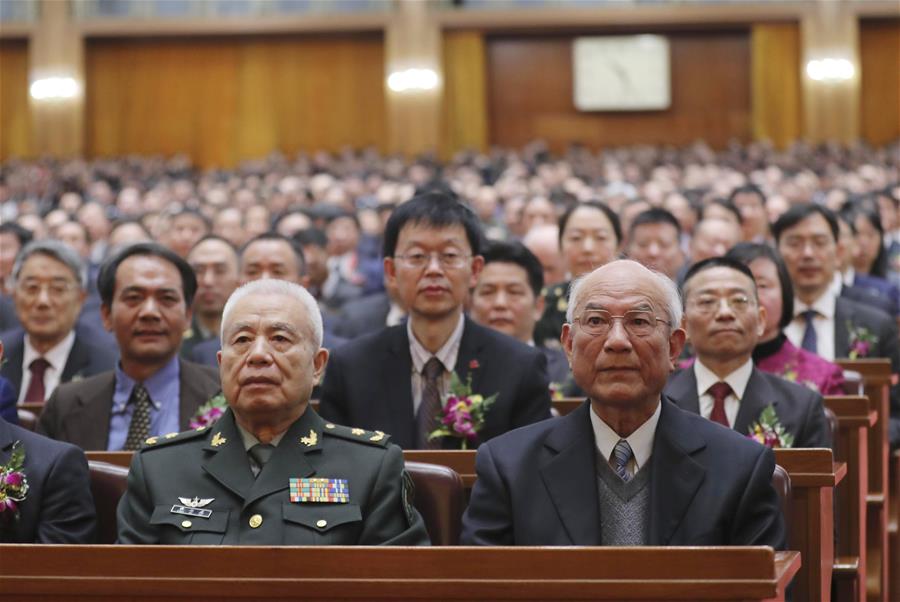China honors distinguished scientists
President Xi Jinping presented China's top science award to Liu Yongtan and Qian Qihu on Tuesday for "outstanding contributions to scientific and technological innovation."
President Xi Jinping presented China's top science award to Liu Yongtan and Qian Qihu on Tuesday for "outstanding contributions to scientific and technological innovation."
Xi, also general secretary of the Communist Party of China (CPC) Central Committee and chairman of the Central Military Commission, awarded the medals and certificates at an annual ceremony held in Beijing to honor distinguished scientists, engineers and research.

Chinese President Xi Jinping (C), also general secretary of the Communist Party of China (CPC) Central Committee and chairman of the Central Military Commission, presents China's top science award to Liu Yongtan (R) and Qian Qihu during an annual ceremony to honor distinguished scientists, engineers, and research achievements at the Great Hall of the People in Beijing, capital of China, Jan. 8, 2019. [Photo/Xinhua]
Liu Yongtan, an academician of the Chinese Academy of Sciences (CAS) and the Chinese Academy of Engineering (CAE), is from Harbin Institute of Technology, and Qian Qihu, a CAE academician, is from the Army Engineering University.
Xi shook their hands and expressed congratulations.
Members of the Standing Committee of the Political Bureau of the CPC Central Committee Li Keqiang, Wang Huning and Han Zheng were also present.
The ceremony honored 278 projects, with 38 winning the State Natural Science Award, 67 the State Technological Invention Award, and 173 the State Scientific and Technological Progress Award.
Five foreign experts won the International Science and Technology Cooperation Award.
Innovation appeal
On behalf of the CPC Central Committee and the State Council, Premier Li Keqiang extended congratulations to award winners and thanked foreign experts for their support of China's science and technology development.
Li said China had achieved remarkable progress in science and technology since the country's reform and opening-up, with the past year witnessing excellent performance in the field.
He called on science and technology workers to follow Xi Jinping Thought on Socialism with Chinese Characteristics for a New Era, grasp new trends in science, technology revolutions and industrial transformation, and implement the innovation-driven development strategy.
"Basic research should be given more priority, and receive more long-term and stable support," Li said. "The development of basic research, applied research, and industrialization should be integrated to build an open, coordinated and efficient research platform."
"We should deepen the reform on the scientific and technological system, innovate the scientific and technological investment policy and the fund management system, as well as expand the decision-making rights of scientists and researchers in choosing technological routes, utilizing funds, and transforming their research achievements."
He stressed the need to strengthen the role of enterprise in innovation, and the integration of industries, universities and research institutes, with more market-driven means applied to encourage entrepreneurship.
"China will step up building the system for IPR creation, protection, application and services, and cracking down on IPR infringement and counterfeiting," he said.
Vice Premier Han Zheng presided over the ceremony, attended by about 3,300 people.
Before the ceremony, Xi and other leaders met the winners or their representatives.

Liu Yongtan (R, front) and Qian Qihu (L, front) attend an annual ceremony to honor distinguished scientists, engineers and research in Beijing, capital of China, Jan. 8, 2019. [Photo/Xinhua]
Diverse achievements
The two top science award winners are gray-haired professors over 80.
Liu Yongtan has focused on domestic maritime radar, helping create full monitoring of the country's seas.
Qian Qihu set up the theoretical system for China's modern defense engineering and contributed to creating a below ground defense infrastructure.
They were each awarded 8 million yuan (1.16 million U.S. dollars), 3 million yuan more than previous winners.
Major breakthroughs in basic research were also highlighted. Xue Qikun, 55, won the State Natural Science Award for pioneering contributions to the quantum anomalous Hall effect, a discovery that will help accelerate the development of low-power consumption electronics.
Xue, a professor of Tsinghua University and a CAS academician, is known as the "7-11 professor" because in his early years studying abroad, he was often seen entering the laboratory at 7 am and coming out as 11 pm. He almost never took a weekend off.
Awarded projects included core technologies supporting China's economic and social development, as well as innovation in improving livelihoods.
He Jishan, a professor at Central South University and a CAE academician, won the first prize of the State Technology Invention Award, for developing large-depth wide-field electromagnetic exploration technology and equipment.
He has dedicated himself in using this advanced equipment to detect underground resources, with high precision.
Li Luming, a professor of Tsinghua University, won first prize in the State Scientific and Technological Progress Award, with his research in brain pacemakers.
His team has made brain pacemakers cheaper, smaller, lighter and more durable, benefiting China's 2 million Parkinson's disease sufferers.
Research associated with people's daily life, such as high-yield cucumbers, minimally invasive lung cancer treatment and advanced flower preservation technology, also received awards.

The National Science and Technology Award Conference is held in Beijing, capital of China, Jan. 8, 2019. [Photo/Xinhua]
Inspiring vitality
China's media and netizens applauded the winners as "superstars."
In an online report, People's Daily paid tribute to all 31 top science award winners, saying that the public should take the time to reading their stories.
"Science rocks! Hats off to scientists!" said a user of social network Weibo. Another said it was hard to imagine what the scientists had done and the sacrifices they went through.
Over the past 40 years, China has granted more than 100,000 national science awards, covering achievements in areas such as high-temperature super conducting material, manned space flight, Qinghai-Tibet Railway, supercomputers and hybrid rice.
Since the 18th CPC National Congress in 2012, China has remained on a path of innovation and creative vitality, fueled by deep reform.
"Tremendous changes have happened to the science and technology system in our country in recent years, with scientific research conditions greatly improved," said Gao Junping, a professor at the China Agriculture University. He received an award for his research in cultivating flowers.
Over the past five years, China has swiftly advanced in science and technology. Innovation has been a primary driving force, underpinning growth and development.
China's R&D investment in 2016 exceeded the EU, and was second only to the United States, accounting for 21 percent of global R&D investment.
The country has the world's largest number of R&D personnel, and ranks second in the world for the number of scientific papers published in international journals.
Science and technology contribute 55.3 percent of economic growth in China.
"China's basic research is under a critical transition from quantity accumulation to a quality leap, and from some breakthroughs to overall capability enhancement," Xue said.
But it still takes time for the country to join world's advanced scientific and technological elite. Only one Chinese has won a Nobel Prize in natural science.
"There are still significant gaps if comparing our fundamental research and innovation capacity with those of leading countries in science and technology. We shall never stop our pursuit and make persistent efforts," Xue said.

